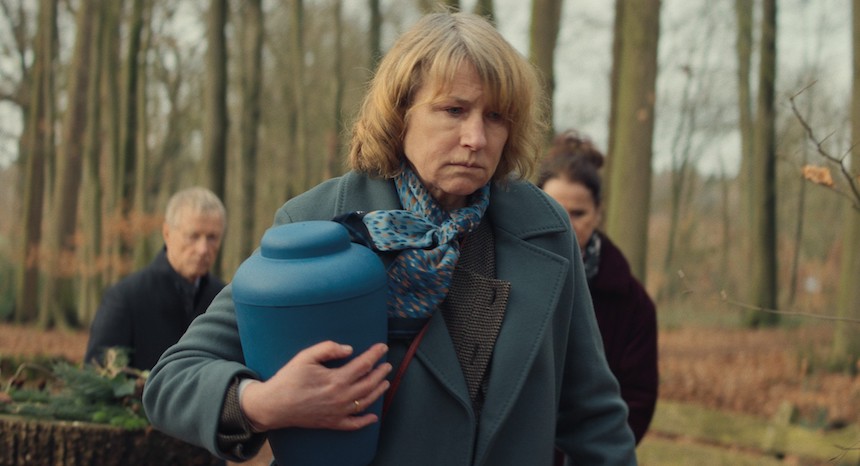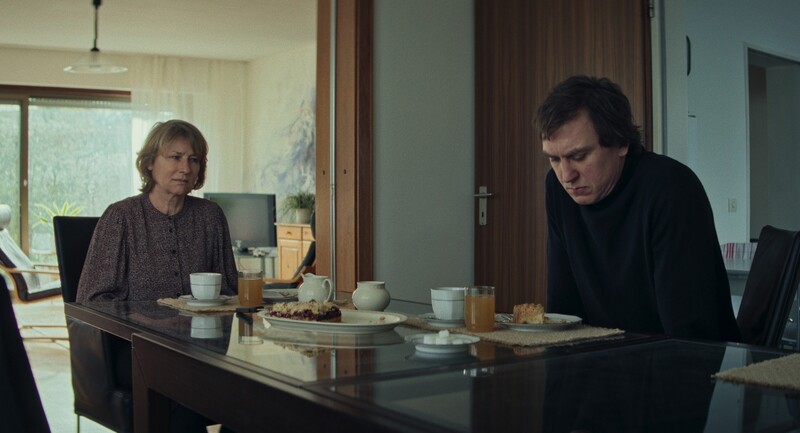Berlinale 2024 Review: DYING, Darkly Humorous Gaze Into Family Dysfunction
Michael Glasner's dramedy explores the dissonant lives of the Lunies family, intertwining themes of death, reconciliation, and the complexities of human relationships.

Michael Glasner's newest cinematic offering, Dying, delves into the intricate and fragmented lives of the Lunies family, long estranged until the inescapable event of death forces them to confront their disconnection. This film explores the themes of life's fragility, the absurdity of existence, and the poignant acceptance of death as a fundamental aspect of life.
Glasner intricately segments the family saga into chapters, each revolving around a different member, providing a comprehensive view of their inner lives. Central to the narrative is Lissy Lunies (Corinna Harfouch), a woman in her mid-70s grappling with the care of her husband, Gerd (Hans-Uwe Bauer), who is progressively deteriorating due to dementia.
The burden of caregiving gradually overwhelms Lissy, leading to a momentary sense of relief when Gerd is admitted to a nursing home. Her respite is fleeting, however, as she soon faces her own grave health issues.
The story's pivotal force is Lissy's son, Tom (Lars Eidinger), who finds himself under pressure as he prepares for the premiere of his latest work, Dying, composed by his friend Bernard (Robert Gwisdek), aiming to meet the expectations of Bernard, the sponsors, and the audience. Amidst this professional endeavor, life intervenes dramatically: Tom is called upon to assist his ex-girlfriend, Liv (Anna Bederke), who goes into labor just as Gerd is being transferred to a nursing home.
This already tense scenario is further complicated by the unavailability of the Lunies family's youngest member, Ellen (Lilith Stangenberg), who is unreachable and out of communication. Tom finds himself swamped by these significant life changes, struggling to navigate the challenges presented by family obligations and professional commitments.
Glasner delves deep into the complexities of a profoundly intricate narrative in Dying, yet he manages to streamline the storytelling across each chapter, making the film's three-hour duration feel remarkably light. Dying emerges as either a touching and almost cathartic family drama or a dark family comedy, depending on one's viewpoint, adeptly avoiding the pathos typically associated with such narratives.
The director eschews sentimentality, opting instead for a candid dissection of traditional values with remarkable honesty, leaving no taboo unexplored. The film attains a surprisingly therapeutic dimension when Lissy and Tom engage in an unrestrained dialogue that elicits as many gasps of shock as it does bursts of relieved laughter, showcasing the director's skill in balancing profound emotional depth with elements of humor.
The Lunies family navigates life without having all the answers, a fitting narrative choice for a film so titled. As Lissy reveals, life unfolds step by step, a journey the Lunies embark on amidst various challenges. Glasner accelerates the plot's pace, reflecting Tom's efforts to conduct a composition that his friend and colleague, Bernard, perpetually finds unsatisfactory, regardless of the adjustments made.
This mirrors Tom's increasing responsibilities as he steps into a quasi-paternal role, given Liv's decision to limit the biological father's involvement to the bare minimum. Gerd's deteriorating condition becomes a catalyst for reevaluating the family's estrangement, driving home the film's exploration of reconciliation and the complexities of familial relationships.
Dying dismantles any romanticized notions or sentiments of an ideal happy family, opting instead for a portrayal steeped in reality. It reveals family ties as complex and challenging to navigate, particularly when individuals struggle with personal issues. The characters are deeply flawed; Tom, for instance, is labeled as cold by his ex-girlfriend at a moment when he believes he is acting righteously.
Glasner's film transcends the conventional family drama, drawing parallels with Scandinavian cinema through its character portrayals, interpersonal dynamics, and the pursuit of redemption amid adversity. Dying approaches the raw edge of films like Ex-Drummer in the realm of family dramas, yet Glasner skillfully moderates the eccentricities, avoiding a descent into the extreme.
Dying is densely packed with themes and narratives, yet Glasner skilfully navigates through each layer, topic, and character in a captivating manner. As Tom endeavors to maintain control over his life, his sister Ellen embarks on a hedonistic and self-destructive spree, embodying a defiant disregard for consequences.
Amidst the backdrop of parental and sibling dysfunction, Bernard stands out as a choleric character grappling with severe depression, while Tom's ex-girlfriend emerges as a figure of relative normalcy in a tapestry rich with complexity. Glasner's adept handling of these diverse elements lends the film an absorbing quality, expertly balancing the intricate dynamics of a profoundly troubled family.
While Dying navigates through themes of death, terminal illness, fractured lives, and the darker specters of human experience, Michael Glasner intersperses moments of sweetness and redemption in the most unexpected places, far from the realm of conventional or anticipated gestures that stray from reality. Remarkably, amid a narrative dense with gravity, Glasner elicits bursts of laughter from an audience slightly taken aback by their own reactions.
In a world where Toni Erdmann was once hailed as the pinnacle of contemporary German comedies, Glasner surpasses this benchmark with an effortless grace. His success lies in weaving irreverent humor into a tapestry of stark realism, without resorting to exaggeration or grotesque distortion.
Dying won the Silver Bear for the Best Screenplay, Guild Film Prize and Berliner Morgenpost Readers' Jury Award.









